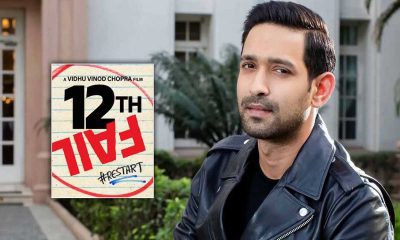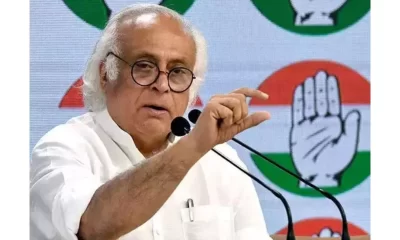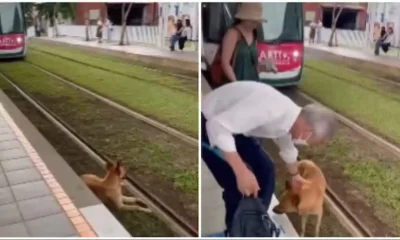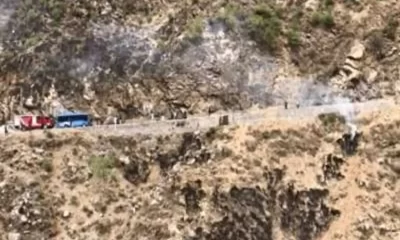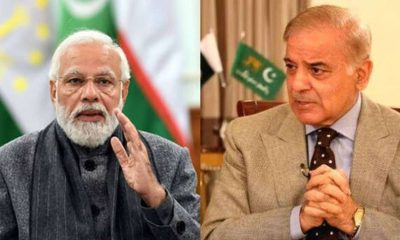Latest world news
FATF keeps Pak on grey list, says it has shown no understanding of terror financing
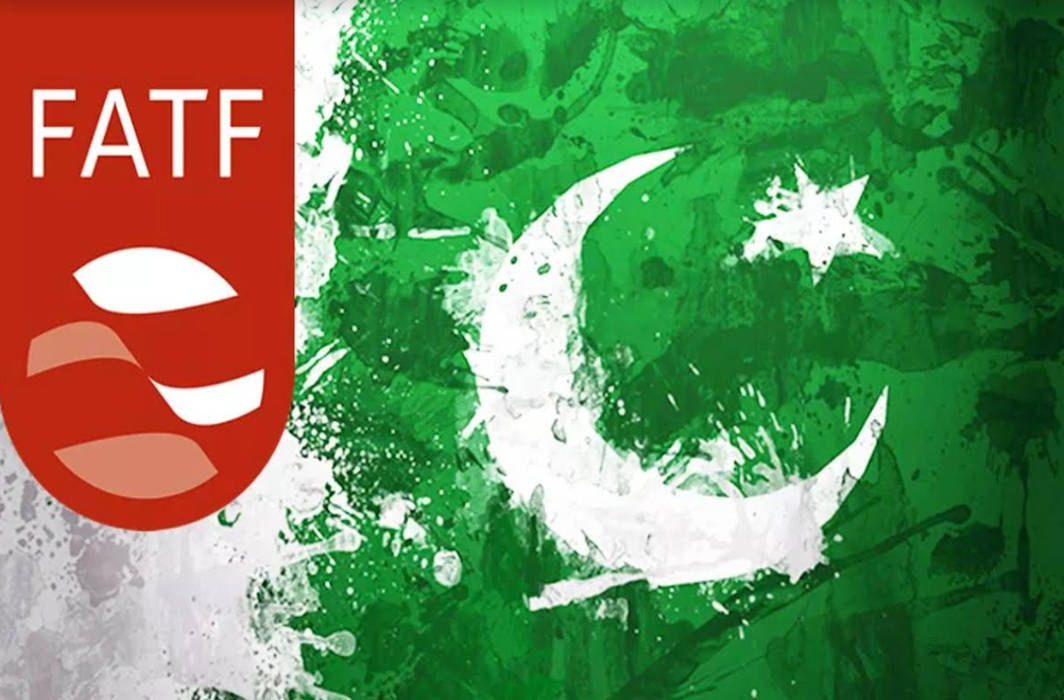
[vc_row][vc_column][vc_column_text]Condemning Pulwama terror attack, terror financing watchdog Financial Action Task Force (FATF) said Pakistan has shown no understanding of funding of terrorist outfits like Jaish-e-Mohammad (JeM) and Lashkar-e-Taiba (LeT) and decided to keep Pakistan on its ‘grey list’ till October.
India had made a strong push to ensure that Islamabad is not taken off the list, in the light of the Pulwama terror attack. Pakistan, however, managed to escape getting into the ‘black list’.
Earlier this week, France said they were pushing FATF to keep Pakistan on the grey list, given its non-compliance with FATF rules, but also as a move after the Pulwama attack. Pakistani officials tried hard to get off the grey list, insisting they were in compliance.
Pakistan’s inclusion on the list keeps international pressure on Pakistan to clean up its act on terror support and terror financing. It makes it harder for its government to access international markets at a time when the economy is stumbling. While there are no direct legal implications, it brings extra scrutiny from regulators and financial institutions that can chill trade and investment.
The Paris-based FATF noted that Pakistan has made only “limited progress” on curbing money laundering and terrorism financing, failing to show a proper understanding of the risks posed by JuD, LeT, JeM and others.
High alert at Mumbai Railway stations after LeT terror threat inputs
The remarks came at the FATF’s plenary meeting in Paris that was held in the backdrop of the Pulwama terror attack, in which 40 CRPF personnel were killed last week.
Expressing grave concern over the violent terrorist attack, the 38-member watchdog said it could not have occurred without money and the means to move funds between terrorist supporters.
The FATF said Pakistan should continue to work on implementing its action plan to address its strategic deficiencies, including by adequately demonstrating its proper understanding of the terror financing risks posed by the terrorist groups and conducting supervision on a risk-sensitive basis.
“Pakistan has revised its TF (terror financing) risk assessment. However, it does not demonstrate a proper understanding of the TF risks posed by Da’esh (ISIS), AL-Qaida, JuD (Jamat-ud-Dawa), FIF (Falah-e-Insaniat Foundation), LeT (Lashkar-e-Taiba), JeM (Jaish-e-Mohammad), HQN (Haqqani Network) and persons affiliated with the Taliban,” the statement said.
“Given the limited progress on action plan items … the FATF urges Pakistan to swiftly complete its action plan, particularly those with timelines of May 2019,” the FATF said in a statement.
Ensure Kashmiris are not boycotted or attacked, Supreme Court orders states
Pakistan had to demonstrate compliance on five counts by February, but there has been negligible movement by Islamabad. It needed to show sanctions were being applied in cases of money laundering and terrorism financing, demonstrate better cooperation between authorities identifying illegal money flows, and enhance support for prosecutors, among other measures, the FATF said.
As a last minute gesture, Pakistan reinstated the bans on Falah-i-Insaniyat and Jamaat-ud-Dawa, two front organisations of the Lashkar-e-Taiba. These organisations had been banned by a presidential ordinance by the former Nawaz Sharif government, but the ordinance was allowed to lapse by the Imran Khan government.
India had been pressing the FATF to put Pakistan on the blacklist and had submitted a dossier to the watchdog, making a strong case against Pakistan’s non-compliance in curbing terror funding.
Pakistan is already in the grey list and has time till October to avoid being blacklisted, technically referred to as countries under ‘high-risk and other monitored jurisdiction.’ Iran and North Korea are currently blacklisted.
In June 2018, Pakistan made a high-level political commitment to work with the FATF and the Asia Pacific Group to address its strategic counter-terrorist financing-related deficiencies.
Two suspected terrorists of Jaish-e-Mohammed group arrested from UP’s Deoband
To avoid being blacklisted in October this year, it had committed that “law enforcement agencies are identifying and investigating the widest range of terror funding activities and that terror funding investigations and prosecutions target designated persons and entities, and persons and entities acting on behalf of or at the direction of the designated persons or entities.”
India had informed the FATF that Pakistan is falling short of its commitments drastically as the proscribed terror outfits and individuals continue to act from its territory and bleed India.
China yields, UNSC statement names Jaish-e-Mohammad in condemning Pulwama attack
When Pakistan was put under the grey list last year, its all-weather friend China and Saudi Arabia, which has an observer status at the FATF, refused to shield it. India is hoping that it can ultimately build enough pressure to push for Pakistan’s blacklisting later this year. The blacklisting will prevent institutions like IMF from financially supporting Pakistan that it can ill-afford at this time.
On Thursday night, the United Nations Security Council (UNSC) had strongly condemned the Pulwama attack and, signalling a clear shift, China signed off on a UNSC statement that “condemned in the strongest terms” the Pulwama terror attack and named Pakistan-based JeM for the “heinous and cowardly suicide bombing”.[/vc_column_text][/vc_column][/vc_row]
Latest world news
World Earth Day 2024: Google Doodle showcases aerial view of planet’s natural beauty
Google celebrated Earth Day 2024 with a special doodle featuring an aerial view of our planet’s biodiversity.
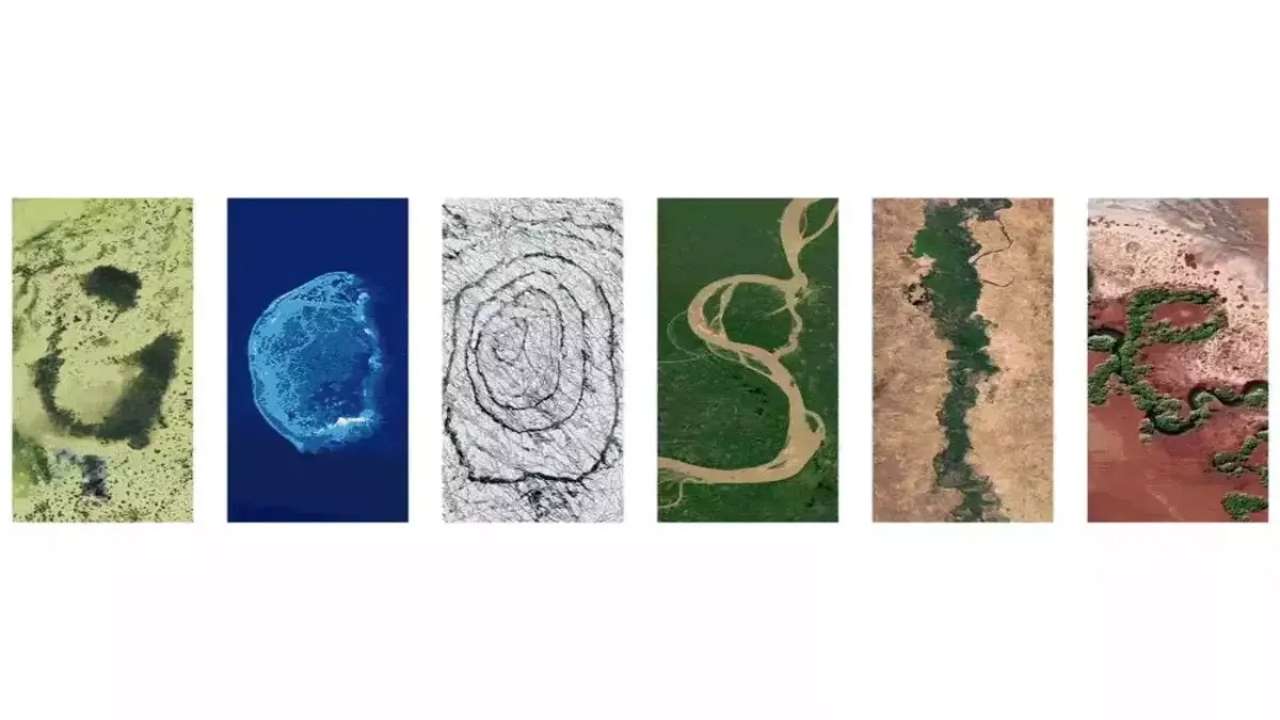
Google shared a doodle today to celebrate World Earth Day 2024, which showcased aerial photos of the planet’s biodiversity and natural beauty. Google reminded us of the importance of protecting planet earth for future generations with the help of this doodle.
The Google letters depict specific locations across the globe where people, communities, and governments work every day to help protect the planet’s natural beauty, biodiversity, and resources, according to the explanation of the annual Earth Day 2024 doodle on their website.
It said, these examples remind us that there’s much more to do to address the climate crisis and biodiversity loss, but also offer the promise of hope and optimism.
The islands of Turks and Caicos are represented by the letter “G.” The islands’ conservation efforts are concentrated on protecting important regions for biodiversity and addressing persistent environmental problems.
The largest reef in the southern Gulf of Mexico and a UNESCO biosphere reserve, Scorpion Reef National Park, is represented by the letter “O” in the Mexican flag.
The letter “O” features Iceland’s Vatnajokull National Park, which was designated as a national park in 2008 following decades of advocacy. The ecology within and surrounding the biggest glacier in Europe is safeguarded by this UNESCO World Heritage Site.
The letter “G” has the Jau National Park in Brazil on it. It is a UNESCO World Heritage Site and one of the biggest forest reserves in South America.
The Great Green Wall of Nigeria is represented by the letter “L,” and the Pilbara Islands Nature Reserves of Australia are represented by the letter “E.”
Meanwhile, Earth Day is a worldwide event that promotes protection of the environment every year. April 22 serves as a reminder of the importance of conservation efforts and sustainable practices to guarantee a healthier world and a brighter future.
The occasion inspires people across the world to come together and take action to protect the environment, strengthening our bonds with nature and promoting good change.
Latest world news
Bigg Boss 14 contestant Rahul Vaidya struggles walking in knee deep water, compares Dubai rains with Mumbai floods
Singer and TV personality Rahul Vaidya was recently stranded in the Dubai rains.

Rahul Vaidya, who was in Dubai ahead of his show which was scheduled to take place today, left the country due to heavy rains and reached Kolkata. The artist shared on social media his encounters in the UAE city, including challenges like walking through knee-deep water. Rahul provided an update regarding the heavy rainfall in Dubai on his Instagram profile.
The Bigg Boss 14 contestant revealed that he was in Kolkata and prepared to do an evening performance. Recalling the terrifying period he went through, Vaidya said there was a lot of confusion and panic in Dubai. The situation was similar to that when heavy floods hit Mumbai in 2005.
Vaiday also posted seval other images and videos of cars that were underwater and flooded roadways. The Bigg Boss 14 contestant, who shared his ordeal, claimed that even though it had just rained for two hours, the situation was dire.
In one of the video, which went viral he can be seen struggling in walking in knee-deep water. He can be also seen holding his sneakers in one hand and with other hand he was seen managing other things.
This is the result of the two hours of rain that it had, he can be heard saying in the video. Vidya also said he dosen’t believe Dubai is accustomed to a lot of rain. Everything had stopped working, he remarked.
After taking part in the first season of the singing reality show Indian Idol, Rahul Vaidya gained widespread recognition. In addition to Bigg Boss, he took part in Khatron Ke Khiladi 11.
Meanwhile, heavy rains that triggered flooding in the UAE and Bahrain, which left 18 people dead in Oman on Sunday and Monday, have paralyzed the financial hub of the Middle East, Dubai.
A lot of incoming flights were diverted from Dubai’s international airport because of the rain. At 7:26 p.m., the busiest airport in the world for foreign visitors stopped accepting new arrivals; a gradual resumption was announced for more than two hours later.
Images of planes navigating flooded tarmacs are making the rounds on social media.
According to pictures shared on social media, the flagship malls Dubai Mall and Mall of the Emirates both experienced heavy floods, while at least one Dubai Metro station had water up to the ankles.
There were several road collapses, severe flooding in residential areas, and numerous reports of leaks from windows, doors, and roofs.
Due to the unfavourable weather, schools around the United Arab Emirates were forced to close, and as more storms are predicted, the closures are anticipated to last until Wednesday. The government of Dubai allowed its staff to work remotely till this Wednesday.
Latest world news
Dubai sky turns green during storm in UAE, video goes viral
The UAE witnessed record-breaking rainfall on Tuesday and the National Centre of Meteorology recorded 254 mm of rainfall in less than 24 hrs in the Khatm Al Shakla area in Al Ain.

1 person was killed in UAE as it witnessed heavy rainfall on Tuesday, stranding commuters, flooding roads, disrupting trains and flights and resulting in water leakage from mall ceilings. The UAE witnessed record-breaking rainfall on Tuesday and the National Centre of Meteorology recorded 254 mm of rainfall in less than 24 hrs in the Khatm Al Shakla area in Al Ain. It is being said that the rainfall was the highest documented since the start of data collection in 1949.
The heavy rainfall in UAE came days after a similar situation in neighbouring Oman, where 13 people were killed in flash floods. Many parts of Oman saw torrential rains, which caused students to be trapped in buses and swept away motorists and trapped people in their homes.
Videos from Dubai circulating on social media showed widespread waterlogging on roads in Abu Dhabi, Dubai and other important cities. This left daily commuters in cars and other vehicles struggling to get back home. Dubai metro station too was seen flooded and closed.
One such video circulating on social media shows the aerial view of the city of Dubai from the top of a building. In the video the stormy winds are seen blowing over the city of Dubai. As the storm intensifies the Dubai sky turns green and ultimately gets covered by heavy rainfall. The video has gone viral on social media with more than 1.1 million views.
Another video showed water leakage from the ceilings of shopping malls, flooding the floors and destroying goods. A video which was shot in the famous Mall of the Emirates, showed pieces of ceiling falling as the rainwater gushed inside. Videos from many outlets of the Deira City Centre mall chain showed escalators being rendered unusable. Majid Al Futtaim, the company which owns the Mall of Emirates, said that the shopping complexes have been kept open and the customers are being sent away from the flooded areas.
-
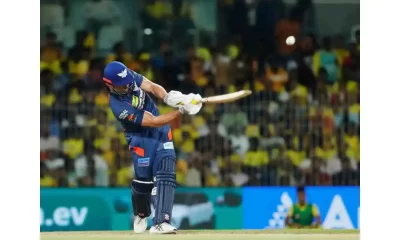
 Cricket news19 hours ago
Cricket news19 hours agoIPL 2024: Marcus Stoinis hits first IPL century as Lucknow Super Giants beat Chennai Super Kings by 6 wickets
-
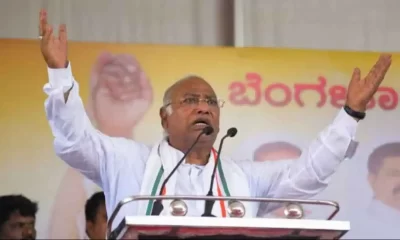
 2024 Lok Sabha Elections10 hours ago
2024 Lok Sabha Elections10 hours agoMallikarjun Kharge vows to continue politics till his last breath to defeat BJP
-
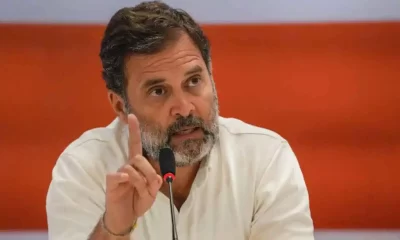
 2024 Lok Sabha Elections17 hours ago
2024 Lok Sabha Elections17 hours agoRahul Gandhi clarifies on wealth survey remark, says aim is to identify injustice
-
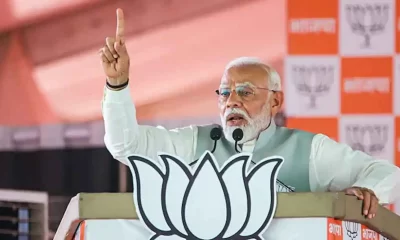
 2024 Lok Sabha Elections14 hours ago
2024 Lok Sabha Elections14 hours agoPM Narendra Modi slams Congress over Sam Pitroda’s inheritance tax remarks, accuses Congress of intending to impose higher taxes
-
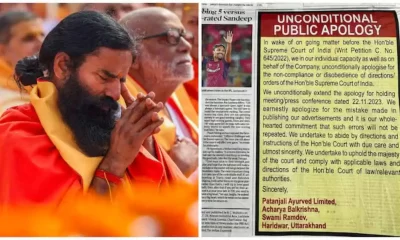
 India News16 hours ago
India News16 hours agoRamdev, Balkrishna publish bigger apology in newspapers after Supreme Court’s rap
-
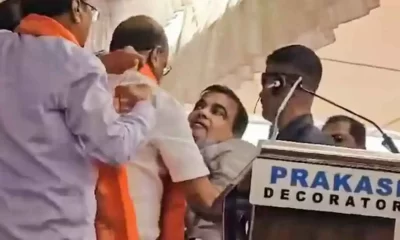
 2024 Lok Sabha Elections11 hours ago
2024 Lok Sabha Elections11 hours agoNitin Gadkari says he’s better now after collapsing at election rally in Maharashtra’s Yavatmal
-
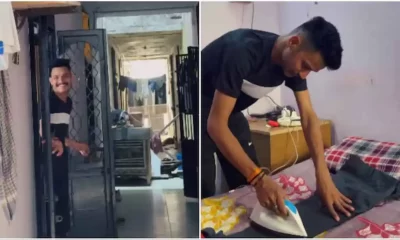
 Trending15 hours ago
Trending15 hours agoA waiter’s life: Social media users go emotional on watching viral video
-

 Entertainment12 hours ago
Entertainment12 hours agoMadhuri Dixit, Karisma Kapoor recreate Dil To Pagal Hai dance battle on Dance Deewane

